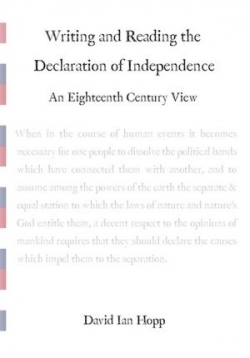Writing and Reading the Declaration of Independence
Few documents in American or even world history were as successful in stirring the soul as the Declaration of Independence. Retired nuclear physicist, David Hopp, is one for whom Thomas Jefferson’s words continue to resonate, and in this examination of the Declaration, Hopp shares his passion and his appreciation of that great work.
This is not some fawning, flag-waving fluff of flattery. Hopp instead dissects the Declaration—phrase by phrase in some cases—to explain what each thought means and where it came from. Jefferson, as Hopp notes, “drew upon the harmonizing events of the day,” and did so not to insert new ideas into the body politic but to summarize and bring together those ideas into a single, forceful, and unassailable argument for action.
Hopp is second to none in his praise for this now sacred document (although he notes that it was not revered as such until well after Jefferson’s own presidency). What Hopp adds to the groaning library of studies on the Declaration, however, is his reminder that the document was meant to be read out loud to a population. “Jefferson wrote for the ear,” observes Hopp. The “cadence, phrasing, even individual words” of the sentence structure chosen by Jefferson is not simply “brilliant,” says Hopp, but also shows that “the Declaration was to be read and heard for effect.”
Hopp individually examines each of the major clauses in the preamble. He also breaks down the twenty-seven arguments for action presented by Jefferson, and shows how this staccato of facts helped inspire a desire to take the action Jefferson demands – to declare independence from the Crown.
If this was all Hopp did in his work it would be a job well-done, but the author gives the reader much more.
The preface, for example, is perhaps the single best short summary of the events leading up to the American Revolution to be presented in recent memory.
In addition to examining each section of the Declaration of Independence, what it meant, where it came from, and who said or wrote it first, Hopp also examines those sections that were cut out. This part of his work is especially compelling and fresh. Few who study the document point out that whole clauses and even entire sentences of the original draft were excised by the editors, i.e., other delegates to the Continental Congress.
One huge paragraph dealing with “this assemblage of horrors” called slavery was expunged at the insistence of the delegates from South Carolina and Georgia, with the support of many northerners whom Jefferson himself admitted were “a little tender” on the issue. It should be noted, however, that Jefferson did not (in that section) call for the freeing of slaves or indentured servants, but merely that it was an example of how the Crown “has waged cruel war against human nature itself, violating it’s most sacred rights of life and liberty in the persons of a distant people who never offended him, captivating & carrying them into slavery in another hemisphere.”
It is, of course, what was kept in the Declaration of Independence, however, that Hopp writes of most. If “life, liberty, and the pursuit of happiness” is an uplifting attention getter of an opening, it is the concluding line, wherein “we mutually pledge our lives, our fortunes and our sacred Honor,” that Hopp praises as “a brilliant rhetorical stroke.”
“As a matter of rhetoric,” says Hopp, in his own concluding remarks, “adding the six syllables ‘and our sacred Honor’ lifts the end of the document into what every presidential speech-writer (and every ad-man) wants: a take-away.”
“It sounds great in a document that was written to be read aloud,” observes Hopp cogently, “its cadence is characteristically Jefferson’s and ties back to the phrase, ‘life, liberty and the pursuit of happiness.’ It is as bold as John Hancock’s signature,” concludes Hopp with conviction. Hopp believes that when that final line is spoken, “You can still hear the huzzahs from Washington’s assembled troops if you listen.”
Those troops, and Washington himself, were they allowed the privilege to read Hopp’s work, would surely give the author a similar cheer. Hopp, like Jefferson, deserves a mighty “huzzah.”
Reviewed by
Mark G. McLaughlin
Disclosure: This article is not an endorsement, but a review. The publisher of this book provided free copies of the book and paid a small fee to have their book reviewed by a professional reviewer. Foreword Reviews and Clarion Reviews make no guarantee that the publisher will receive a positive review. Foreword Magazine, Inc. is disclosing this in accordance with the Federal Trade Commission’s 16 CFR, Part 255.

